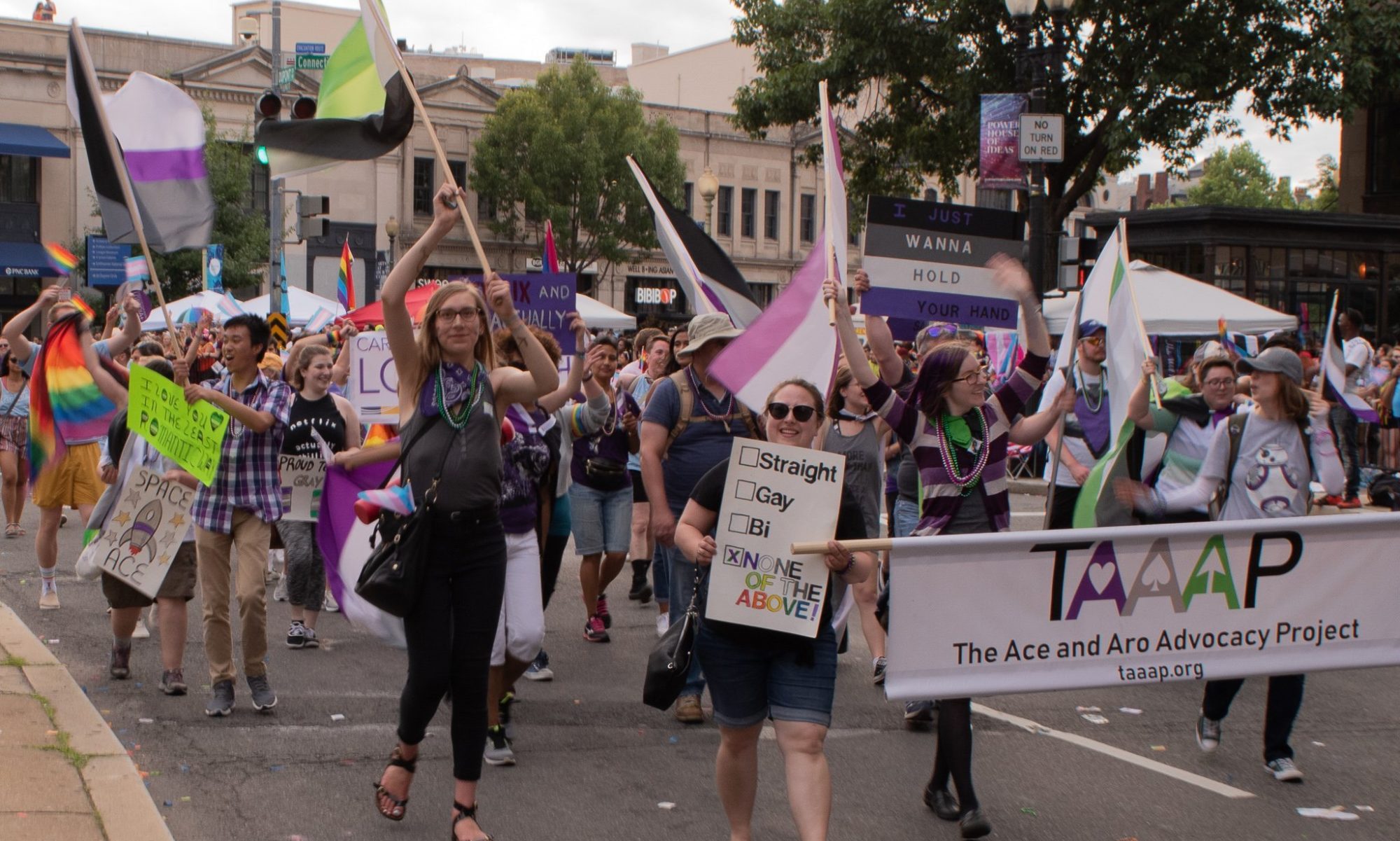By Laura G. and Emily K.
The National LGBTQ Task Force is one of the leading organizations in the LGBTQ Social Justice Movement. On January 24th-28th, 2018, in Washington DC, the Task Force will be hosting their 30th annual Creating Change Conference. This conference trains attendees on how to incorporate intersecting social justice movements into the LGBTQIA+ community. In a win for asexuality, a total of five sessions on asexuality have been accepted, as well as an etiquette guide on ace inclusion that was included in the program.
The Sessions
Four sessions were proposed by members of the Asexuality Awareness Project and Asexuals of the Mid-Atlantic. These sessions were as follows:
Ask an Asexual: An Introduction to the Ace Spectrum – Workshop Session 1, 9:00 AM Friday January 26th
Heterosexual, homosexual, bisexual, asexual—the four core sexual orientations. Asexuality is the least understood of these, and this workshop will explore the nuance. After a brief presentation of common terminology, definitions, and examples of intersections with other identities, a panel of ace community activists will lead a discussion about asexuality and aromanticism. Remember, there’s no such thing as stupid questions! Panelists are ready to discuss quite varied personal experiences, current community issues on asexuality, and more.
Asexuality, Aromanticism, and Relationships – Caucus 1, 6:30 PM Friday January 26th
This workshop will help asexual and allosexual attendees explore relationship options, from friendship, to family, to romance. Speakers will discuss their own experience as asexuals with different levels of romantic attraction; one aromantic (no romantic attraction), one alloromantic (yes romantic attraction), and one gray-romantic (somewhere in between). Participants will develop tools to address differences in sexual and romantic attraction, as well as relationship boundaries, and will leave with a better understanding of their own needs and desires in relationships.
Ace Access: Asexuals and the Doctor’s Office – Caucus 2, 6:30 PM Saturday January 27th
The purpose of this caucus is to bring together various regional and community ace groups to get a clearer national and international view on the difficulties faced by asexuals in medical situations. Asexuality only recently was vaguely acknowledged in the DSM, with a stipulation that if the patient does not feel distress at their lack of sexual attraction then they cannot be diagnosed with hypoactive sexual desire disorder. This is not a strong enough acknowledgement of asexuality as a valid orientation to prevent asexuals from experiencing difficulty receiving proper treatment when they seek out mental health care. Asexuality also affects interactions in primary care, since many asexuals experience disbelief about their lack of sexual activity and dismissiveness when their orientation is mentioned. With this caucus we hope to create plans of action both for creating material to prepare medical professionals for the needs of our community and to brainstorm tools for asexuals when they are searching for a new doctor or trying to deal with a difficult situation while seeking treatment. Participants will hopefully leave feeling more empowered in their interactions with healthcare professionals and a better set of tools than avoiding doctors altogether.
Asexual, Grey-Asexual, and Aromantic Spectrum Caucus – Caucus 2, 6:30 PM Saturday January 27th
This caucus is a space for people who identify under the asexual and/or aromantic umbrellas to come together and share experiences. Intersectionality of asexuality or aromanticism with attendees’ other marginalized identities will be given careful consideration as we brainstorm how to make our activism and support spaces more inclusive and respectful. Please note this is not for 101 questions, although curious allies are welcome to come listen, or chat with us in the ace suite.
An additional session on asexuality will be presented by an independent party:
Racing Ace: Asexuality, Race, and Social Justice – Workshop Session 4, 4:45 PM Friday January 26th
This workshop will help attendees become familiar with and improve existing knowledge of compulsory sexuality versus non-sexuality and asexuality. Session leaders will discuss how the aforementioned sexual identities and practices are affected by conceptions of race. We will discuss the role asexual identity movements can play in addressing the racialized (a)sexualization of communities. Participants will practice their advocacy for LGBTQI* communities to be aware and inclusive of the racialized beliefs shaping discourses on asexuality, sex positivity, and compulsory sexuality. Attendees will be able to ask questions and receive practical advice for helping others understand asexuality as it intersects with race.
2017 to 2018: The Numbers Compared
In 2017, the word “asexual” was included in the creating change program 7 times, and there were only two sessions on asexuality. In 2018, the word “asexual” was mentioned 79 times, in large part because there was an ace etiquette guide included in the program. But also five sessions were included on asexuality!
Looking to the Future
The proposal made by members of TAAP to have an officially recognized asexuality suite did not come to fruition for the 2018 conference, however, the “unofficial” ace suite will still be taking place. Hopefully, the January 2019 conference in Detroit, Michigan can make this change to full ace inclusion.
